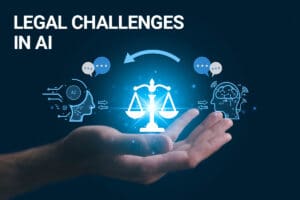Legal Challenges in AI

Legal Challenges in AI
Introduction
Artificial Intelligence (AI) has become a transformative technology that is reshaping various industries and transforming the way we live and work. However, the legal implications of AI pose significant challenges that need to be addressed. This document explores some of the key legal challenges associated with AI and discusses the implications that these legal challenges have on society.
Ethical Considerations
One of the key challenges in AI is ethical considerations. As AI systems become more powerful and pervasive, it becomes increasingly important to ensure that the development and deployment of AI are ethical. This includes issues such as fairness, privacy, and accountability. For example, the use of AI algorithms in decision-making processes can introduce biases and inequalities, leading to unfair outcomes. Similarly, the misuse of AI technology can have serious consequences for individuals and society.
Privacy and Data Protection
The use of AI technology raises concerns about privacy and data protection. As AI systems collect vast amounts of personal data, there is a risk that this data could be misused or compromised. It is important for legal frameworks to ensure that individuals have control over their personal data and that AI systems handle this data responsibly. Additionally, the development of robust data protection regulations is necessary to prevent data breaches and protect individuals’ privacy.
Liability and Risk Management
Another legal challenge is determining liability for AI-related incidents. As AI systems become more complex and sophisticated, there is a potential for errors or accidents caused by AI algorithms. This can lead to legal disputes over who is responsible for such incidents. Liability issues also extend to AI systems that are used in autonomous systems, such as self-driving cars. Determining the roles and responsibilities of different stakeholders involved in the development of AI systems is crucial for establishing clear liability frameworks.
Intellectual Property and Ownership
AI systems rely on vast amounts of training data and algorithms, which are subject to intellectual property rights. The ownership of AI-generated content, such as art or music, is also a matter of debate. Clear legal frameworks need to be established to protect the rights of both the creators of AI systems and the owners of the underlying data. This is particularly important in the context of AI-driven innovation, where intellectual property rights can be crucial in facilitating commercial exploitation of AI technologies.
Employment and Work
The impact of AI on employment and work practices raises significant legal challenges. As AI technologies replace certain tasks traditionally performed by humans, there is a potential for job losses and workforce displacement. It is crucial for governments, employers, and individuals to address these challenges through policies that promote workforce reskilling, fair compensation, and responsible use of AI technologies in the workplace.
Regulatory Frameworks
Developing and implementing regulatory frameworks to guide the development and use of AI technologies is crucial. These frameworks need to ensure that AI systems are developed and used responsibly, taking into account ethical considerations, privacy, data protection, and other legal requirements. Moreover, regulatory frameworks need to evolve to keep up with the pace of AI innovation and anticipate future challenges.
Conclusion
The legal implications of AI present both challenges and opportunities for society. Ethical considerations, privacy, data protection, liability, intellectual property, and employment are all key areas that require attention and legal frameworks to ensure a responsible development and deployment of AI technologies. By addressing these challenges, we can harness the full potential of AI while safeguarding the public interest.
